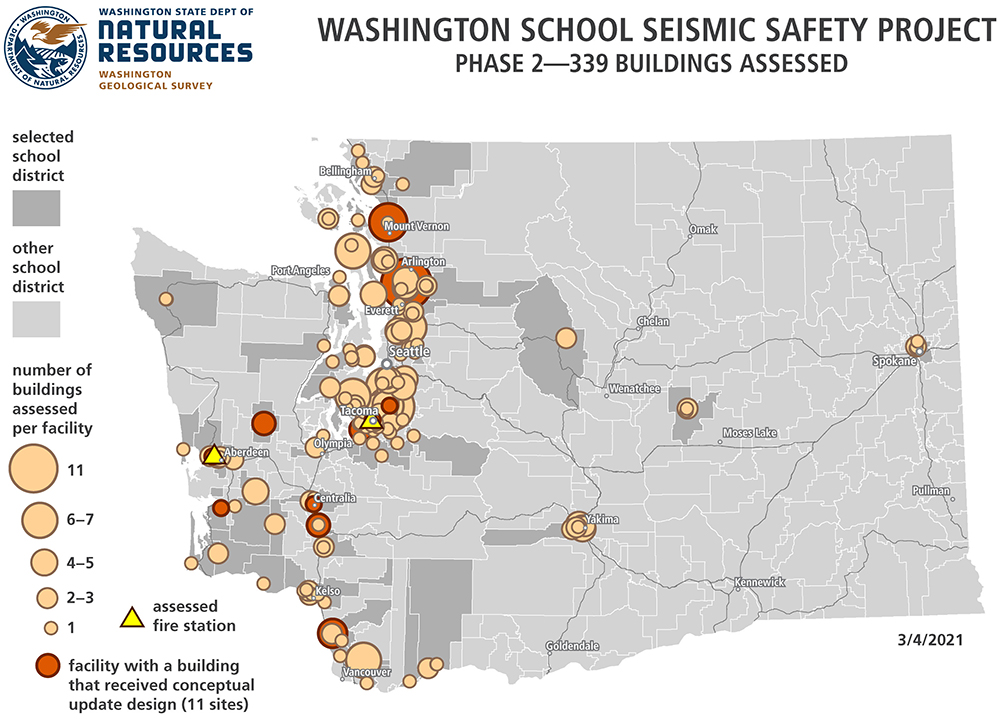This week, we got very encouraging and hopeful news that suggests momentum is building in the Legislature for one of NPI’s top 2022 legislative session priorities.
Representative Gerry Pollet and Senator David Frockt led bipartisan groups of state lawmakers in introducing legislation that would finally provide meaningful funding to upgrade many of Washington State’s seismically vulnerable schools.
The bills (HB 2095 and SB 5933) would create a school seismic safety grant program, backed by general obligation bonds that would need to be voter-approved in a special statewide vote to be held this November.
As the bill’s intent section explains:
The legislature finds that a significant number of Washington students in public school districts and state tribal education compact schools attend school in older facilities located in geologically active areas. Accordingly, the legislature intends to create a grant program to help school districts and state tribal education compact schools cover the cost of retrofitting or relocating school facilities located in high seismic areas or tsunami zones.
This perfectly aligns with one of our ten adopted priorities for 2022: Protect youth, teachers, and school staff from geologic hazards by providing state funding to replace or repair seismically vulnerable buildings.
Washington has waited far too long to take action to address this problem. As Seattle Times reporter Sandi Doughton explained last fall, our neighbors Oregon and British Columbia are ahead of us in upgrading school buildings and making them super resilient so they can be used for community disaster recovery.
This legislation authorizes the sale of general obligation bonds in the amount of $500 million “to finance all or a part of the cost” of school seismic safety projects “and all costs incidental thereto.” As mentioned, the bonds would need to be authorized by voters in a statewide election; that’s due to the Constitution’s limitations on state, county, and municipal indebtedness.
Funds would be distributed in phases of $100,000,000 per biennium over five biennia, beginning with the 2023–2025 biennium, according to Section 5 of the bill. Buildings constructed before 1998 that have not received a seismic retrofit to 2005 standards would be eligible for grant funding is they are located in a high seismic hazard area. The legislation provides technical definitions for what constitutes a high risk area, one earthquake-specific and one tsunami-specific.
Grant applications would be evaluated by an advisory committee appointed by the Superintendent of Public Instruction (currently Chris Reykdal). The superintendent would then propose a list of projects to the governor, and they would make appropriations requests to the Legislature after selecting projects.
Importantly, grant amounts would have to be “equal to at least two-thirds of the estimated total project cost” (Section 2, Subsection 5ii).
This key provision will ensure that school districts will get meaningful financial support from the state, with the state shouldering most of the cost, as opposed to a token contribution that wouldn’t be enough to actually proceed with new buildings or retrofits of existing buildings due to insufficient local funding.
The full bill text is below, and available on leg.wa.gov.
Text of Senate Bill 5933 (school seismic safety)Four years ago, NPI asked the Legislature to appropriate funds to enable the Department of Natural Resources to study the seismic risk of the state’s school buildings. Although the Legislature did not provide all of the funding we asked for, enough was budgeted to enable an initial inventory to be conducted.
DNR’s Washington Geological Survey completed the work that the Legislature funded last June and delivered a very sobering report, which you can read below.
School seismic safety legislative report from DNRWe took notice of the report, as did former Representative Jim Buck, KING5, and The Seattle Times, but it didn’t get the kind of attention that it should have.
Representative Pollet, Senator Frockt, and Superintendent Reykdal, who all care deeply about taking action to fix this problem, have been trying to figure out a path forward since then, and this legislation is what they’ve come up with. As mentioned, it has Republican cosponsors, which is really encouraging.
The Senate version will have a hearing this coming Monday in Ways & Means, at 4 PM. I will be speaking in support of the bill on NPI’s behalf.
If the legislation is successful, NPI will make passage of the statewide ballot measure to authorize the bonds its top electoral priority in the 2022 midterms.
We encourage readers to sign in PRO on the bill; you can do that right here.


Thanks, Andrew. Good job.